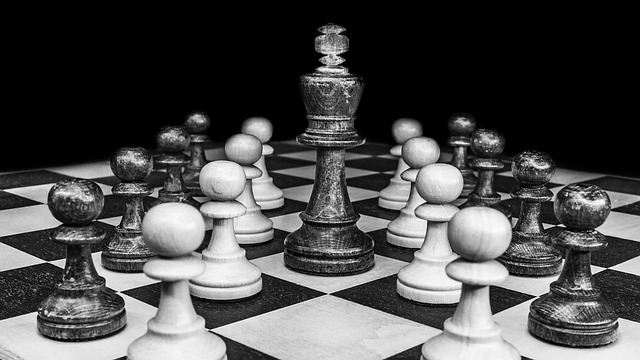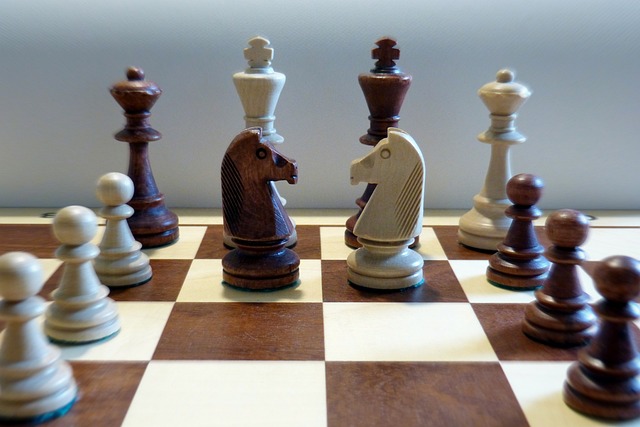Welcome to the realm of chess endgames, where strategic finesse and tactical prowess collide! Whether you’re a novice player striving to improve or an experienced grandmaster seeking to fine-tune your skills, the path to mastery lies within the intricacies of endgame play.
In this article, we will explore the best approaches to practicing chess endgames, enabling you to enhance your decision-making abilities, seize victories, and outmaneuver your opponents in the final stages of the game.
What separates the masters from the amateurs in chess endgames?
In the realm of chess endgames, the true masters distinguish themselves from the amateurs through their remarkable ability to navigate the complexities of these final stages. They possess an intuitive understanding of the inherent dynamics, the delicate balance between offense and defense, and the strategic subtleties that can turn the tides in their favor.
By honing their skills and acquiring a deep knowledge of endgame principles, the masters have elevated themselves to a level where they consistently outmaneuver their opponents and achieve victory when it matters most.
How can a solid understanding of pawn structures transform your endgame skills?
Pawn structures are the building blocks of chess, and their impact on the endgame is no exception. A solid understanding of pawn structures can work wonders in transforming your endgame skills.
By recognizing the strengths and weaknesses of pawn formations, you can strategically position your pieces, create powerful outposts, and exploit critical vulnerabilities in your opponent’s defense. Every pawn structure tells a story, and by deciphering its narrative, you gain a tactical advantage that can lead to decisive victories in the endgame.
Which key principles should guide your decision-making in complex endgame scenarios?

In the realm of complex endgame scenarios, a few key principles act as guiding stars, illuminating the path to success. First and foremost is the principle of activity, which emphasizes the importance of activating your pieces and maximizing their influence on the board.
Secondly, accurate calculation and foresight become paramount, as even the slightest inaccuracy can tip the scales in favor of your opponent. Additionally, maintaining a sound pawn structure, harmonizing your pieces, and maintaining flexibility are crucial aspects that govern your decision-making process in these intricate endgame positions.
Are there any effective techniques to improve calculation and visualization in endgames?
Calculating and visualizing the consequences of your moves in the endgame can be a daunting task, but fear not, as there are effective techniques to enhance these essential skills. Regular practice and solving tactical puzzles sharpen your calculation abilities, enabling you to accurately predict the ramifications of each move.
Visualization exercises, such as mentally playing out different variations and scenarios, expand your chess imagination and enhance your ability to envision winning plans. By incorporating these techniques into your training regimen, you’ll soon find yourself making precise and far-sighted decisions in the endgame.
How can you leverage the power of piece coordination to dominate the endgame battlefield?
Piece coordination is the secret weapon that can help you dominate the endgame battlefield. By harmonizing your pieces and orchestrating their collective efforts, you create a symphony of tactical possibilities. Cooperative maneuvers between your pieces create threats, establish strong defensive structures, and exploit weaknesses in your opponent’s position.
Through precise coordination, you’ll unleash the full potential of your army, gaining control over key squares, restraining your opponent’s counterplay, and ultimately securing victory in the endgame.
What are the most common mistakes players make when approaching chess endgames?
Chess endgames can be treacherous terrain, and even seasoned players can fall victim to common pitfalls. One of the most prevalent mistakes is neglecting the importance of king activity, leaving this crucial piece inactive and vulnerable. Premature pawn advances without proper calculation often backfire, leading to weakened pawn structures or unexpected counterplay.
Another mistake is underestimating the power of piece activity, failing to mobilize them effectively and missing out on valuable opportunities. By avoiding these common mistakes and developing a deeper understanding of endgame dynamics, you can navigate the challenges with confidence and increase your chances of success.
Is studying classic endgame examples essential for sharpening your skills?

Studying classic endgame examples is an indispensable aspect of sharpening your skills in chess. These timeless masterpieces of endgame artistry provide valuable insights into strategic concepts, tactical motifs, and winning plans.
By immersing yourself in the games of the legendary players, you gain exposure to a myriad of techniques, ideas, and positional nuances that shape the endgame landscape. Classic endgame examples serve as a source of inspiration and education, allowing you to internalize the wisdom of the past and apply it to your own play, ultimately propelling you toward endgame excellence.
How can you develop a strong intuition for the right moves in critical endgame positions?
Developing a strong intuition for the right moves in critical endgame positions is a skill that can be honed through practice and experience. By immersing yourself in studying and analyzing various endgame scenarios, you train your mind to recognize patterns, evaluate positions, and intuitively sense the most promising course of action.
Engaging in tactical puzzles and actively playing endgame-focused games also helps sharpen your intuition by exposing you to different strategic ideas and forcing you to make instinctive decisions. Over time, your intuition becomes a reliable compass, guiding you towards the optimal moves in those decisive endgame moments.
Are there any specific training exercises to enhance your endgame strategy?
To enhance your endgame strategy, specific training exercises can be immensely beneficial. One effective exercise is to solve endgame puzzles or positions with a limited number of pieces. By analyzing and finding the best moves to achieve a desired outcome, you develop critical thinking skills and deepen your understanding of endgame concepts.
Playing through annotated endgame games of strong players also provides valuable insights into strategic maneuvers and winning plans. Additionally, practicing endgame drills, such as king and pawn endgames or rook endgames, can refine your technical skills and improve your decision-making in real-game situations.
What are the psychological aspects to consider when playing chess endgames?
Chess endgames are not merely battles of pieces, but also psychological tests that require mental fortitude and resilience. One crucial aspect to consider is maintaining composure and avoiding impulsive moves born out of frustration or anxiety. Patience plays a vital role, as endgames often require maneuvering and waiting for the right moment to strike.
It’s important to stay focused, even in seemingly simplified positions, as a single oversight can prove costly. Additionally, being aware of your opponent’s psychological vulnerabilities can help you exploit their fears and induce mistakes. By understanding and managing the psychological aspects of chess endgames, you can gain a psychological edge and tilt the balance in your favor.
Can the study of endgame studies and compositions elevate your game to new heights?

The study of endgame studies and compositions has the power to elevate your game to new heights. These intricate and artistic creations of endgame positions are not only aesthetically pleasing but also offer valuable insights into the beauty and complexity of endgame play. By analyzing and attempting to solve these studies, you train your analytical skills, enhance your creativity, and deepen your understanding of strategic concepts.
The imaginative solutions and ingenious ideas found in endgame studies inspire you to think outside the box and approach endgame situations with a fresh perspective. The study of endgame studies and compositions serves as a wellspring of inspiration, enabling you to discover hidden resources and unleash your creative potential in your own games.
How can you exploit positional weaknesses to gain an advantage in the endgame?
Exploiting positional weaknesses is a powerful technique to gain an advantage in the endgame. Identifying weaknesses such as weak pawns, vulnerable king safety, or poorly coordinated pieces, allows you to formulate a plan to target and exploit those vulnerabilities. By focusing your efforts on these weak points, you can apply pressure, create threats, and force concessions from your opponent.
Probing weaknesses with accurate piece maneuvers, tactical strikes, and strategic pawn breaks can disrupt their defensive harmony and pave the way for a decisive breakthrough. Understanding how to exploit positional weaknesses equips you with a potent weapon to tilt the balance of power in the endgame to your advantage.
Are there any recommended resources and books to deepen your knowledge of chess endgames?
There is a wealth of recommended resources and books available to deepen your knowledge of chess endgames. “Dvoretsky’s Endgame Manual” by Mark Dvoretsky is a comprehensive guide that covers a wide range of endgame topics, offering in-depth analysis and practical advice. “Silman’s Complete Endgame Course” by Jeremy Silman provides a structured approach, guiding readers from fundamental endgame concepts to advanced techniques.
For those interested in classic endgame studies, “100 Endgames You Must Know” by Jesus de la Villa is a valuable resource. Online platforms and databases, such as chess.com, offer a vast collection of endgame articles, videos, and interactive lessons. Exploring these resources, alongside studying annotated games of renowned endgame specialists, empowers you to broaden your understanding and master the intricacies of chess endgames.
What are the benefits of analyzing your own endgame performances?
Analyzing your own endgame performances yields numerous benefits that can fuel your progress as a chess player. By reviewing your games, you gain insight into your decision-making process, identifying strengths to capitalize on and weaknesses to address. Analyzing endgames highlights specific areas where you need improvement, such as calculation, piece coordination, or endgame strategies.
It allows you to learn from your mistakes, discover alternative plans, and develop a deeper understanding of the underlying principles. Moreover, self-analysis instills a sense of ownership and responsibility for your progress, empowering you to take control of your development and strive for continuous improvement in your endgame play.
How can you maintain focus and make accurate decisions under time pressure in the endgame?
| Practice Method | Benefits | Considerations |
|---|---|---|
| Tactical puzzles | Improves calculation skills Sharpens pattern recognition Enhances problem-solving abilities |
May not cover all endgame scenarios Focuses primarily on tactical aspects |
| Endgame studies | Explores artistic and complex positions Develops creativity and imagination Reveals hidden resources and winning plans |
Not always practical for real-game situations Requires familiarity with basic endgame principles |
| Analyzing master games | Provides insights into strategic maneuvers Offers exposure to different endgame ideas Develops a deeper understanding of positional play |
May require time and effort to study and analyze Application in one’s own games can be challenging |
| Endgame drills | Enhances technical skills Improves decision-making in specific endgame types Builds familiarity with common endgame motifs |
Focuses on specific endgame types May lack the complexity of real-game situations |
| Playing practice games | Applies endgame knowledge in practical scenarios Develops adaptability and intuition Offers opportunities to test and refine strategies |
May not always replicate high-pressure tournament situations Requires finding suitable opponents for practice |
Maintaining focus and making accurate decisions under time pressure in the endgame can be challenging but not impossible. One effective strategy is to prioritize and allocate your time wisely, dedicating more attention to critical positions and complex decisions. Developing strong time management skills through practice helps you make efficient use of the available time.
Staying calm and composed, even in the face of time constraints, is crucial to avoid hasty and potentially detrimental moves. Another valuable technique is to anticipate common endgame scenarios and prepare beforehand, which reduces the time needed for calculations during the game. By training yourself to maintain focus and composure, you can navigate the endgame with confidence, making accurate decisions even when the clock is ticking.
Closing statements
In conclusion, the world of chess endgames is a captivating realm where strategic brilliance and calculated precision intersect. By delving into the various aspects discussed in this article, you can embark on a journey toward endgame mastery.
Whether it’s developing your intuition, enhancing your strategy through targeted exercises, considering the psychological elements, exploring endgame studies, exploiting positional weaknesses, utilizing recommended resources, analyzing your own performances, or maintaining focus under time pressure, each facet contributes to your growth as a formidable endgame player.
Embrace the challenges, study the greats, and persistently practice, for it is through this dedicated pursuit that you will unlock the secrets of the endgame and take your chess skills to unparalleled heights. May your future endgame battles be filled with triumph and your moves be hailed as masterpieces on the chessboard.




